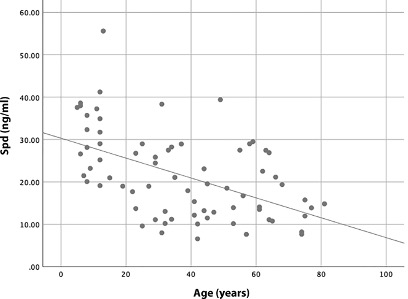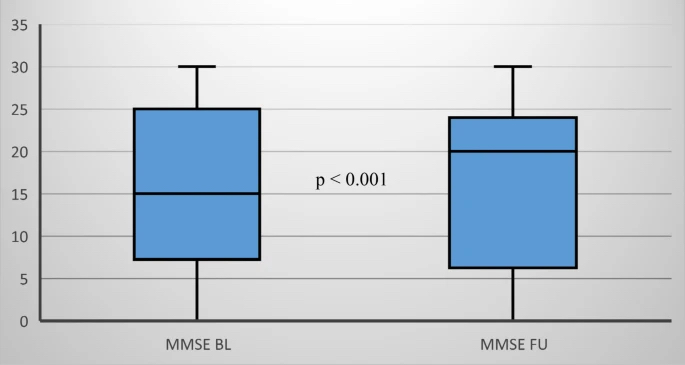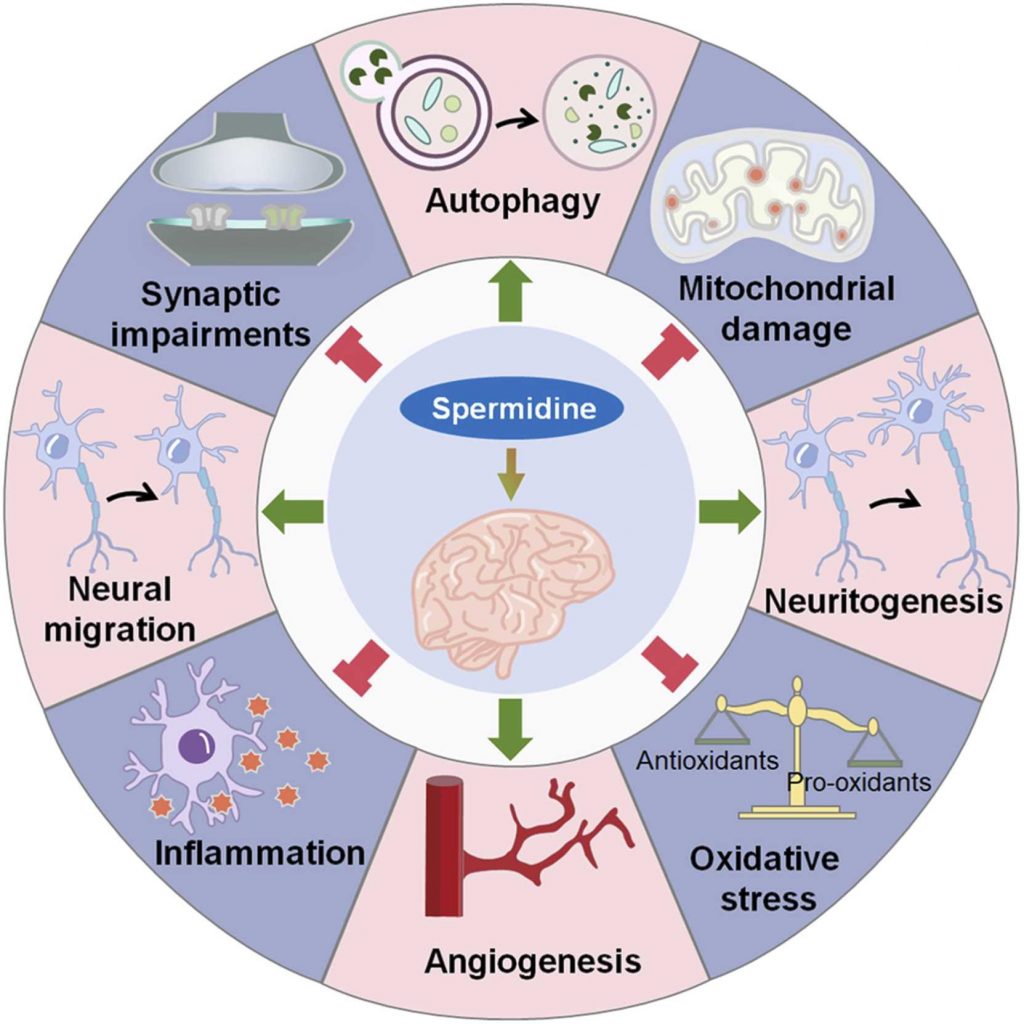Key Points:
- Spermidine levels decline with age, and low spermidine is associated with cognitive impairment, dementia, and neurodegeneration.
- Supplementing with spermidine leads to improvements in memory and cognitive performance.
- Spermidine targets several underlying biological drivers of aging, including autophagy impairments, mitochondrial damage, and inflammation.
While eating less (caloric restriction or fasting) clearly benefits longevity and health, sustaining such a restrictive diet can be difficult and unpleasant. For these reasons, scientists have searched for compounds capable of recapitulating the benefits of consuming fewer calories, so far identifying several promising candidates, including spermidine.
Mouse studies have shown that spermidine has multiple anti-aging effects, including protection against cognitive decline and extension of lifespan. However, the next section of this article will focus on human studies, particularly those that provide evidence for spermidine’s effects against cognitive aging and dementia.
Spermidine Maintains Healthy Brain Aging in Humans
Spermidine is the most abundant polyamine (an organic compound containing two or more amino groups) in our body. In 1984, the polyamine levels of healthy subjects were found to decline with age. In a later study, it was confirmed more specifically that spermidine levels decline with age. Considering the role of spermidine in vital cellular processes, its age-related decline could account for worsened health and longevity outcomes.

Indeed, further studies revealed that higher dietary spermidine intake is associated with lowering rates of mortality by 24%, cognitive impairment by 27%, dementia by 26%, and Alzheimer’s disease by 47%. Moreover, higher dietary spermidine intake is associated with decreased biological aging and reduced neurodegeneration in regions of the brain like the hippocampus, necessary for consolidating memories, and the cortex, necessary for higher-order thinking and emotional processing. Since low spermidine intake is associated with poor brain health and longevity, it is possible that supplementing spermidine could improve these outcomes.
Spermidine Supplement Promotes Healthy Brain Aging
To explore whether restoring spermidine levels through supplementation is feasible in older adults, a group of German scientists led by Dr. Agnes Flöel tested the safety and tolerability of a spermidine-rich plant extract. The Phase II trial showed that 1.2 mg/day of spermidine for 3 months was safe and tolerable. Dr. Flöel and her colleagues followed up with another trial, showing that 1.2 mg/day of spermidine for 3 months improves memory in older adults with subjective cognitive decline. These findings reveal that spermidine supplementation can, at least modestly, improve the memory of healthy individuals at risk for dementia.

Other scientists have also investigated the effect of spermidine intake on brain aging, including a group of Austrian scientists led by Thomas Pekar. In a 3-month study, older adults were given a bread roll containing either 3.3 mg or 1.9 mg of spermidine to eat for breakfast six days a week. The participants were divided based on whether they had no dementia, mild dementia, moderate dementia, or severe dementia.
The results showed that the higher dose of spermidine was correlated with significant improvements in cognitive performance in participants with mild or moderate dementia. In contrast, the participants who consumed the lower dose saw a decline in cognitive performance. Furthermore, in a follow-up study, older adults were given 3.3 mg of spermidine in their food for a total of 1 year. Pekar and his colleagues found that spermidine supplementation improved cognitive performance in 42% of participants, while 30% of participants saw no changes in performance, and 28% saw a decrease in performance.

Because the Pekar studies did not include a placebo group, it is difficult to say with high certainty that the improvements in cognitive performance observed were due to spermidine supplementation. However, considering the placebo-controlled studies done by Flöel and colleagues, it would seem that spermidine supports improved cognition in older adults.
With that being said, a 1-year study showed that 0.9 mg/day of spermidine from a plant extract did not improve memory. This negative result could possibly be due to the lower dose of spermidine used in the study. This lower dose was used because of the association between high polyamine levels and cancer. For this reason, individuals with a previous history of cancer were excluded from this study.
Along those lines, more human studies will clarify the optimal dose of spermidine needed to prevent cognitive impairments. Notably, the brain may have compensatory mechanisms in place to make up for lost spermidine levels with age, as two different groups, one from Canada and one from the United States, have observed high spermidine levels in the brains of Alzheimer’s patients.
Spermidine’s Beneficial Cellular Effects
Based mostly on animal studies, spermidine is thought to counteract neurodegeneration and dementia primarily through autophagy, a cellular process that removes dysfunctional cellular material, such as misfolded proteins. Through autophagy, spermidine has been shown to induce angiogenesis, the formation of new blood vessels, which can be beneficial under certain conditions. Spermidine has also been shown to prevent several underlying biological drivers of aging, including mitochondrial damage, oxidative stress, and inflammation.
When it comes to the brain specifically, spermidine has been shown to prevent synaptic impairments. Namely, it promotes the synaptic transmission necessary to form new memories, a process called long-term potentiation. Spermidine also supports the formation of new memories by promoting the movement of new neurons (neural migration) and the growth of axons and dendrites (neuritogenesis), which increase the number of synaptic connections in the brain, inducing memory formation.

How to Benefit from Spermidine
Whether supplementing with spermidine is beneficial for those with normal spermidine levels is unclear. While studies show that lower spermidine levels are correlated with older age, not every older adult may have low spermidine levels. Moreover, there is no definition for what concentration of spermidine in the blood is considered “low.” For these reasons, the best way to benefit from spermidine may be to eat spermidine-rich foods that also contain other longevity-associated nutrients like polyphenols and fiber, including oats, broccoli, cauliflower, beans, apples, mangos, and peanuts.
Spermidine is also produced by gut bacteria, so maintaining a healthy gut microbiome may also increase body-wide spermidine levels. A healthy gut can be achieved by eating foods rich in fiber and beneficial gut bacteria called probiotics. When contained in yogurt, one probiotic in particular, Bifidobacterium lactis, was shown to increase spermidine levels in the gut of healthy adults. Other probiotic strains may also increase spermidine levels, so varying the consumption of foods like yogurt, certain cheeses, kimchi, and other fermented products may be beneficial for boosting brain health.